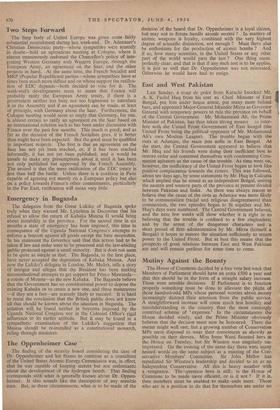East and West Pakistan
Last Sunday, a coup de grace from Karachi knocked Mr. A. K. Fazlul Huq from his seat as Chief Minister of East Bengal, put him under house arrest, put many more behind bars, and appointed Major-General Iskander Mirza as Governor General with temporary powers to rule the province on behalf of -the Central Government. Mr. Mohammed Ali, the Prime Minister of Pakistan, has thus taken strong measur to inter- fere with the United Front Government of East Bengal (the United Front being the political opponent of Mr. Mohammed Ali's own Moslem League). The trouble began with the riots at Adamjee, the main jute mills in East Bengal. At the start, the Central Government appeared to believe that Mr. Huq and his friends were doing their inefficient best to restore order and contented themselves with condemning Com- munist agitators as the cause of the trouble. As time went on, however, the inefficiency of the United Front began to look like, positive complaisance towards the rioters. This was followed, about ten days ago, by some statements by Mr. Huq in Calcutta which implied that he aimed at an independent Bengal, uniting the eastern and western parts of the province, at present divided between Pakistan and India. As there was always reason to believe that the cause of the riots at Adamjce was more likely to be communalism (racial and religious disagreements) than communism, the two episodes began to fit together and Mr. Huq's days were numbered. The Central Government believes, and the next few week's will show whether it is right in so believing that the trouble is confined to a few ringleaders; and by the arrest of the dangerous characters and a short period of firm administration by Mr. Mirza (himself a Bengali) it hopes to restore the situation sufficiently to return power to the United Front. But at best this means that the prospects of good relations between East and West Pakistan are and will remain perilous for some time to come.


































 Previous page
Previous page